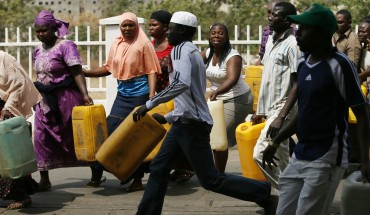With the handover of president Goodluck Jonathan to Muhammadu Buhari coming in a few days on May 29, many Nigerians cannot wait for the resumption of governance that will hopefully resolve some of the problems that appear to defy solution.
While global headlines on Nigeria in the last few months have focused on the battle with the Islamist terrorist group Boko Haram in the north east of the country, the vast majority of Nigerians have in recent weeks been dealing with two practical, but equally debilitating, pair of challenges. We are dealing with yet another round of widespread fuel scarcity in Africa’s largest oil producer and this has been compounded by our usually erratic power supply dropping to an all-time low.
It is safe to say even though there are plenty of challenges that demand his immediate attention, the first item on Buhari’s agenda has to be fixing these problems.
For years, we Nigerians have coped with epileptic power supply by relying more and more on electric generators for everything from household use to manufacturing. Now, the fuel scarcity has prevented us from even that expensive necessity. It is proving near impossible to find fuel at anything close to the official pump price, which was reduced to 87 naira ($0.44) a liter on January 18th as the incumbent Jonathan chased votes ahead of the March 28 elections.
Since that reduction, global oil prices have risen steadily and the currency has been devalued twice, which has increased the local subsidy bill, putting government finances under more pressure.
The result is the government has struggled to meet its subsidy payments to petrol importers, and the uncertainty about whether the incoming Buhari administration will continue with the subsidy programme–which has been increasingly controversial since protests over its removal in January 2012–has seen supply on the streets of major cities dry up.
Even though Nigeria produces oil it needs to import petroleum products because it does not have functioning refineries.
Now, the black market thrives. They are often seen outside petrol stations, young men holding transparent jerry cans with petrol, ready go do quick business with vehicle owners. The petrol they sell now goes for between two or three times the official price. Sometimes this is mixed with water, and some unfortunate motorists have fallen victim and lost their engines as a result.
In the black market, honour is also in short supply.
Those who decide to queue up for petrol lose several hours of productivity, and the queues themselves make already bad traffic jams in Lagos even worse, affecting the productivity of those not queuing.
A growing number of young professionals, whose work relies on the Internet, are also forced to patronise the black market to be able to power laptops, phones and modems, or miss deadlines.
Nearly 18 months after the handover of power assets to private companies, power generation is at all-time low. This is because the majority of power plants are operated by gas, and two important gas pipelines have been vandalised in recent weeks and the government has been unable to secure them, leaving the country in darkness for longer than ever before.
Jonathan could not fix the problem, and now it is up to Buhari.

